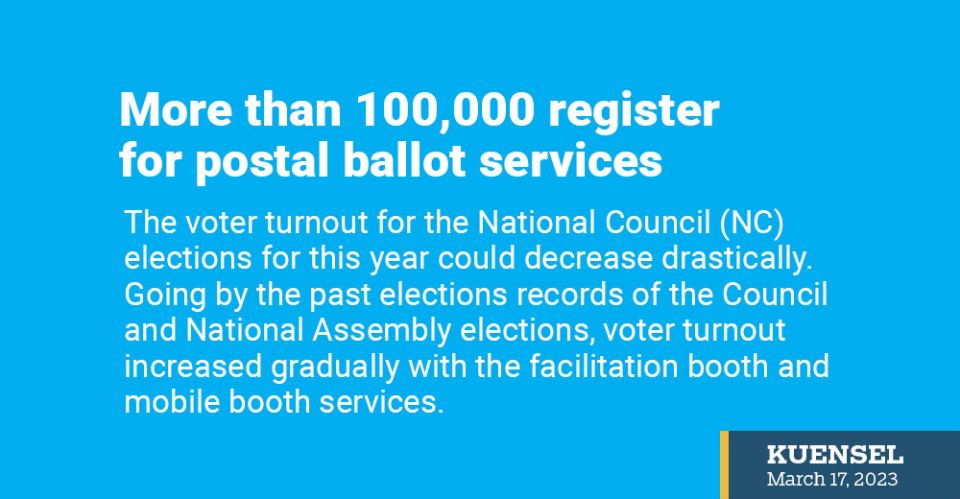
The voter turnout for the National Council (NC) elections for this year could decrease drastically.Going by the past elections records of the Council and National Assembly elections, voter turnout increased gradually with the facilitation booth and mobile booth services.
The record shows that half of the voter turnout included voters who had cast their votes through facilitation booth, mobile booths, and postal ballots.
For the NC elections this year, around 105,753 eligible voters have registered for the postal ballot services—105,077 from in-country and 676 from overseas.
Meanwhile, the Election Commission of Bhutan has also extended postal ballot services to de-suups on duty.
According to the Election Act, postal ballots are eligible for diplomats and persons working in the embassies and their spouse and dependents; persons residing outside Bhutan for the performance of a special government duty; members of the armed forces; civil servants and their dependents and spouses; students and trainees; and any other group of voters as specified by the Commission in consultation with the government.
In 2018, around 88,915 eligible voters registered for the postal ballot services.
ECB has discontinued extending facilitation booths and postal ballots services to other agencies that are not eligible as per the election Act.
Despite ECB providing a facilitation booth in the 2018 NC elections, the voter turnout was only about 54.29 percent. Of the 432,030 registered voters, 169,623 voters cast their votes on the Electronic Voting Machines (EVM) and 64,912 voted through the postal ballots. Of the total, 42,441 cast their votes in nine mobile facilitation and 69 facilitation booths in 20 dzongkhags; 22,471 voted through conventional postal ballots.
Similarly, in the primary round of the National Assembly elections 2018, around 182,518 cast their votes in person on EVM and 108,580 cast their votes through conventional postal ballot, facilitation booth, and mobile booths in 20 dzongkhags.
There were around 438,663 registered voters. Total voter turnout was 66.36 percent.
For the general round of elections 2018, around 199,553 voters cast their votes through EVM and 113,920 cast their votes through facilitation, mobile and conventional booths. The voter turnout was 71.46 percent.
In the 2013 NC elections, of the total 379,819 registered voters, around 147,537 cast their votes through EVM and only about 23,967 cast their votes through postal ballots.
According to the draft electoral roll for the 2023 NC elections, there are around 485,303 registered voters.
Parties’ view on discontinuing facilitation booths
The General Secretary of the People’s Democratic Party (PDP), Kuenga Tashi, said that it is unfortunate to learn about the decision of the ECB to disallow postal ballots and facilitation booths.
However, he said that the parliamentarians should study the law and, if need be, revise it so that all Bhutanese can participate in the electoral process.
He said that the potential voters may choose to stay away from exercising their adult franchise due to reasons of time and financial constraints.
The president of the Bhutan Tendrel Party (BTP), Dasho Pema Chewang, said that the party believes that people’s participation in the electoral process is critical for a democracy.
President said that the importance of elections are clearly articulated in our Constitution which states that the general will of the people shall be the basis of government and shall be expressed through periodic elections.
“We are confident that the commission will ensure a good voter turnout and conduct the elections within the bounds of the law in a fair and transparent manner,” he said.
The Druk Thuendrel Tshogpa (DTT) has done research on the cost and impact of voter turnouts for not providing a facilitation booth. The party is going to take up the issue with the commission.
The Opposition Leader, Dorji Wangdi, said that ECB not extending the services would definitely lead to a drop in voter turnout, hampering credible electoral outcomes in a democracy.












